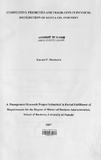| dc.description.abstract | Because of the increased competition and liberalization of oil industry in Kenya, it has
become imperative for the players to identify the dimensions through which to compete.
This study was based on twenty four oil companies processing crude oil at Kenya
Petroleum Refineries with the objective of identifying the competitive priorities that the
firms employ, the constraints to achievement of these competitive priorities and any
trade-off between them in physical distributions.
Primary data was collected for the purpose of this study by use of closed ended and open
ended questionnaires. Part I of the questionnaire collected general information about the
firms while part II collected information to meet the objectives of this study. Data was
analyzed using descriptive statistics of frequencies, proportions, means as well as listings.
Kruskal- Wallis test for non parametric independent group comparisons was used to
analyze the trade-offs between quality, time, cost and flexibility competitive priorities.
The findings of this study indicate that the four competition priorities of quality, cost,
time and flexibility are employed by the firms and are above average in level of
importance. Quality related priorities however were found to be more important than the
other three. This study also found out that the various competitive priorities are affected
by different constraints. The research-.. further found out that quality as a competitive
priority was significantly more important than the other three at 0.05 level of
significance.
In view of this study's findings some recommendations have been made. One, Kenya Oil
companies should use the prioritization of quality, cost, time and flexibility in developing
physical distribution policies and objectives. The government needs to facilitate oil
business by enhancing the capacity of its logistics organizations that have been found out
to constrain the achievement of physical distribution objectives. Oil companies need to
lobby to the governments for representation in formulation of regulatory policies and
legislations. | en |

